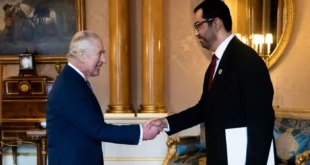Protestors brandish Nazi symbols in central London. “A group of people” riots in Sheffield. Rapists cannot be deported because “human rights”. The economy is flatlining. A third of young people would rather swap liberal democracy for a military rule or a strongman leader.
Tory Prime Minister Rishi Sunak is concerned. But fear not! He has a solution. After reading all the Left-wing think pieces, in which the cure for crime is always — yes — more youth clubs, he has decided this doesn’t go nearly far enough. What we need is, in fact, youth clubs but on steroids: “a bold new model of National Service for 18-year-olds”.
Are the young enthused? As the kids say: lol. The general sentiment is outrage: the Tories locked them in their homes for two years, stunting education and proliferating psychiatric distress. They mortgaged young people’s futures to pay for a fleeting (and, in the end, largely illusory) sense of safety for their elders, leaving behind a legacy of zero growth, crippled businesses, and swingeing taxes to service stratospheric borrowing. They hectored young people about duty, while breaking out the cake and champagne for birthday parties. And now, they propose to impose yet another obligation to Pride and Duty and Cohesion on the young.
Among younger Right-leaning individuals of my acquaintance, the talk is less of voting Tory than of annihilating them. The more vengeful call for “Zero Seats”: a coordinated plan of tactical voting, with the aim of ensuring victory for whichever candidate is most likely to defeat the Tory one. Others, from anons to mainstream journalists, wonder if Sunak has chosen so rebarbative a proposal in a deliberate attempt to throw the election. But I don’t think this is quite right. Rather, it’s a logical consequence of the Tories’ electoral bind, whose nature we can discern in the location he chose to announce the policy: the Mail on Sunday.
There, he told us cheerily that National Service would become a “rite of passage”. It would, he insists, “create a shared sense of purpose among our young people and a renewed sense of pride in our country”. We might, should we be so inclined, snort at Sunak’s delusional effort to reverse engineer a sense of national belonging, by reheating a policy that was only politically palatable in the aftermath of Second World War because that sense of national belonging already existed. We might gesture at the gulf it highlights between the majority-white and broadly patriotic Middle England retirees at which this dead cat — let’s not call it a policy — is addressed, and the increasingly multi-ethnic and post-colonial British Zoomer cohort now reaching maturity.
But what would be the point? Given the current state of polling, no one seriously imagines Sunak is ever going to have to implement this. It’s a fantasy proposal, launched in a newspaper whose average reader is 60, owns their own home, and lives in the South East. It’s addressed, with bleak cynicism, at an electorate whose likelihood of voting Conservative more or less rises in a straight line by age, with the 18-24 group least likely to do so. In other words: this policy is proof positive that Sunak has simply written off younger voters, and opted to speak over their heads to their boomer elders — the Conservatives’ steadily dwindling electoral base — as though the young were simply not there.Nor, we’ve since learned, does this even represent peak Tory gerontification. Yesterday gifted us the “Quadruple Lock”: yet another guarantee for the state pension, clawed from the stagnant wages of Britain’s shrinking corpus of working-age adults. But if the Quadruple Lock is bare-faced clientelism, National Service is a wholly fake policy whose principal objective is to distract those boomers still solipsistic enough to vote Tory from the fact that, just as before Brexit, there’s little to distinguish the Conservative Party from the rest of the uniparty.
This uniparty, which comprises every mainstream political representative of the zombie-liberal consensus, views the British nation-state as effectively obsolete. It’s content-free. It has no culture, no people, nothing to offer other than tourist tat, a flaccid trading zone, and some services that may be obtained on a gym-membership basis by just showing up.
Our foreign policy has long been set by the United States. Our immigration policy is set internationally too, by a mix of corporate interests and international regulations. As for economic policy, the brief and lettuce-like reign of Liz Truss demonstrated (no matter how bonkers you thought her proposals) that any deviation from the City’s preferred approach results in prompt defenestration. Even environmental policy has mostly become a smoke-and-mirrors mix of Davocratic posturing and corporate subsidies, as evidenced by the simultaneous moves to reduce aviation emissions through complicated regulatory mechanisms, while also nodding through expansions to every major UK airport.
Perhaps, in time, we’ll look back on the older nation-state system and shake our heads at its insularity and instability. Meanwhile, though, the emerging system (let’s call it Our Democracy) still has some teething problems. For one thing, it affords no obvious feedback mechanism for managing popular disapproval of truly hated policies. Nor does it offer any basis for larger-scale solidarity, other than identitarian special pleading by “communities”: in practice, an engine for accelerating sectarianism, whose benefits are (to say the least) unevenly distributed.
As such, whenever these shortcomings become too obvious, Our Democracy has a tendency to fall back on invocations of solidarity in the older nation-state style. Here you’ll find the phantoms of “solidarity” or “patriotism”, usually invoked to stifle objections or to wring a few more drops of tax from what’s left of the faltering middle class. The first and starkest case in point was the international decision, after the Global Financial Crash, to use Quantitative Easing to nationalise the unsurvivable losses of “too-big-to-fail” banks that had spent the previous decade privatising the upside of their casino-finance practices. There have been many more since, of which the most recent and egregious is surely nationalising the costs of Human Quantitative Easing, in the form of crumbling infrastructure, GP appointment scarcity, escalating rents and ill-tempered public spaces, all while privatising the increasingly negligible gains in GDP growth.
Are we a nation, or are we not? We aren’t a nation, when there’s any question of preferential treatment based on shared history, heritage, culture or ancestry. We are, though, when it’s a question of coughing up to bankroll whichever set of client-group subsidies this iteration of the uniparty would like to prioritise. Perhaps you think I’m being cynical here, and perhaps I am a little. But the point is a serious one. Were Sunak’s National Service proposal a serious policy, designed to be implemented rather than simply fulminated over in the press, it would be crippled from the word go by a profound structural problem. That is: you can’t de facto abolish the nation state and then demand the yoof all do National Service.
“You can’t de facto abolish the nation state and then demand the yoof all do National Service.”
National Service both presumes a nation and also a sense of belonging and futurity, such that “service” feels like paying it forward. But it’s being proposed by a government which recently locked young people in a cupboard for two years, then deflated the value of their degrees and increased the price, then capered about making nativist gestures while starving public services and stoking a housing crisis via mass migration. Given this, young voters might be forgiven for thinking that they have neither a nation nor much future to speak of, and react with derision to the proposed inculcation in their breasts of “renewed pride in our country”.
But what is Sunak to do? He cannot escape the electoral death trap that is the Tories’ ageing base of Middle England homeowners: the Mail readers who will nod at the prospect of making all those scruffy bus-shelter loiterers with their pronouns and weird little videos stand up straight and contribute to society through some gratifyingly coercive state intervention. And given everyone knows the Tories are going to lose, and that it’s really just a question of how badly, nuking an already written-off youth vote for a few more boomer X’s is — albeit in a short-termist way — grimly pragmatic.
So I doubt Sunak is trying to throw the election. This policy is less deliberate self-sabotage than a tragedy in slow motion: yet another sign, lest we needed one, that the Party of House Prices is circling the drain. And with each orbit of the abyss, his party grows more resigned to the death spiral. With each orbit, the young, bellicose, underground Right turns ever more bitterly away. What, after all, would be the point of trying to reform a party that doesn’t even seem to be aware of your existence, save as a fantasy bloc of doomscrolling skivers in need of improvement via Mental Elf, bans on TikTok and tobacco, and maybe a government-mandated stint wiping bottoms?
Meanwhile, beyond the event horizon of Tory annihilation, a new world beckons. It’s one in which One Nation Tories are no longer the gatekeepers of the Right. One in which the 30% of the youthful electorate who no longer believe in liberal democracy are old enough to wield real power. One in which, perhaps, we’ve stopped pretending that a now comprehensively post-national Britain is in any meaningful sense continuous with the pre-war entity of that name. And one in which we’ve resigned ourselves to a public life whose basic components are NGOcratic hectoring, trading-bloc standoffs, and multipolar post-liberal ethno-narcissism.
What politics will look like at that point is anybody’s guess. But somehow I doubt it will be as preoccupied with nostalgic clickbait.
 Eurasia Press & News
Eurasia Press & News



